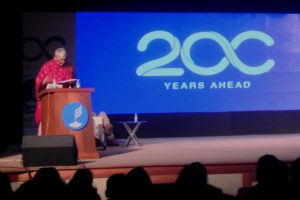Gayatri Chakravorty Spivak outlines challenges of education
At a recent event in Kolkata, Gayatri Chakravorty Spivak raised points on growing problems of education in practice and pushed for reforms for quality education.
Indian scholar, Padma Bhushan Gayatri Chakravorty Spivak shared her views on the ‘Future of Education’ at the Derozio Hall in Presidency University in Kolkata, the capital of eastern Indian state of West Bengal. Presidency University, established as Hindoo College while India was still under British rule, turns 200 this year and as a part of its bicentenary celebration, scholars from various disciplines have been invited to speak on the Global Education Summit being organised by the University. Outlining the major challenges for education in India and abroad, Spivak shared her experiences both as an academician as well as an active participant in international forums. Highlighting on the lack of quality education, she focussed on the narrow vision that current education policies and their implementation showcased.
The Columbia University professor questioned the role of elite universities and its students in addressing their tendency of turning into self-contained spaces. “The picture for a global higher education can only emerge once we are in touch with the problems, that can arise after understanding who we are and the pedagogical methods employed to address the same,” said Spivak. Admitting that those with a humanities background are failing to make an impact in policy making for education, she asserted, “Those on the top practically do not have access to the needs of those at the bottom.” Adrija Maitra, an alumna of Presidency University and a political science student who attended the lecture stated, “Spivak rightly put forth education as the slow cooking of the soul with imaginative flexibility as its prime ingredient to bridge the glaring rift between policy makers and the disadvantaged recipients of inferior education.”
British Council India, in its report in 2014, titled, ‘Understanding India – The Future of Higher Education and Opportunities for International Cooperation’ asserted, “There appears to be no shortage of funding for centrally-funded ‘top tier’ institutions, such as the IITs, IIMs, and Institutes of National Importance,” adding, “The state universities are underfunded but are optimistic that their funding will increase in the future.” Spivak pointed out similar flaws in the educational system of India, which happens to be the world’s largest democracy. “The largest electorate of the society that remains outside the elite universities and whose problems are far from understood are the ones who need to be considered while shaping a global higher education movement,” she remarked.
Active intervention called for
Even as the Indian education remains one of the world’s largest, with Indian Brand Equity Foundation pegging the number of schools in the country at 1.4 million and more than 36,000 higher education institutes, Spivak observes, in her capacity as a member of the Global Futures Council at the World Economic Forum, “While international forums speak of basic universal values and ethics, field work with perspective is required to understand challenges faced by the world today. Solutions to complex problems such as education cannot come as an instant soup of a ‘one size fits all’ template.” She also found flaws in the way statistics for the education sector is recorded. Speaking with an experience of over 30 years in the Jharkhand border area, Spivak clarified, “There are instances where someone who has scored only 2 pc in mathematics was considered to have passed an examination. If the base is built in such a way, where does higher education stand?”
On a concluding note, Spivak stated, “Humanities, as a field, cannot be turned into a cash cow, but students whose imaginations are restricted by market demands must take advantage of their education to go beyond it.” The report by British Council India had stated that international collaboration in the arts, humanities and social sciences is generally lacking and there is an anxiety about the recent neglect of these disciplines in India. Increasing privatisation of education and slow reforms in the education sector also remain major hurdles, and policy makers are yet to address them.










